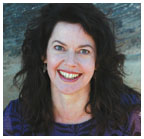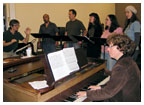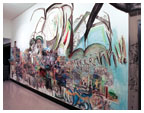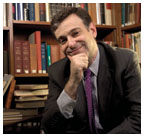June 11, 2008: Books and Arts
Enlightenment for idiots
Anne Cushman ’84 explores one woman’s quest for spiritual awakening
Exploring the messy realities
of war
Lisa Scola Prosek ’81 composes opera about an American soldier
Making a statement through art
John Matteson ’83 wins Pulitzer Prize in biography
For a complete list of books received, click here.
A yoga instructor in California, Anne Cushman ’84 examines the intersection of a spiritual journey and the practical concerns of a Western woman in her debut novel. (Barbara Kremsner ) |
Reading
Room
Enlightenment
for idiots
Anne Cushman ’84 explores one woman’s quest for spiritual
awakening
By Iris Blasi ’03
When Anne Cushman ’84 needed a fourth course to fill her sophomore-year schedule and signed up for Professor Malcolm Diamond’s “The Self in World Religions,” she had no idea that it would alter the trajectory of her life. Struck by the idea of religion as the study of “the purpose of being human,” Cushman switched her major from English to religion, ultimately filming a documentary about life in a Los Angeles Zen Buddhist center for her senior thesis.
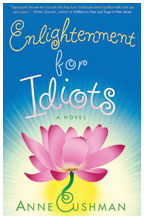 Following
a postgraduation stint in Santa Fe, Cushman went to California to study
yoga — a move that led in 1989 to an editing gig at Yoga Journal,
a perfect fit for the former member of the University Press Club.
During her decade-long editorship, Cushman also traveled extensively in
India to conduct research for a guidebook on studying yoga called
From Here to Nirvana (Riverhead, 1998).
Following
a postgraduation stint in Santa Fe, Cushman went to California to study
yoga — a move that led in 1989 to an editing gig at Yoga Journal,
a perfect fit for the former member of the University Press Club.
During her decade-long editorship, Cushman also traveled extensively in
India to conduct research for a guidebook on studying yoga called
From Here to Nirvana (Riverhead, 1998).
While her guidebook offers listings of ashrams and meditation centers, what Cushman learned is that enlightenment comes from capturing “a sense of aliveness that’s already right here in the ordinary details of life.” That’s the down-to-earth message imparted in her debut novel, Enlightenment for Idiots (Shaye Areheart, April), which Publishers Weekly called “a hilarious take on the quest for truth that manages to respect the journey while skewering many of the travelers.”
The basic premise roughly mirrors that of Cushman’s life: Amanda, an almost-30 yoga instructor and freelance writer, is sent to India to write a guidebook aimed at Americans seeking a spiritual fix. “The book is a work of fiction,” Cushman says, “but I did draw extensively from a world I knew very well.” One of the experiences Cushman adapts for her character is Amanda’s befriending of a yogi who refers to himself as “we”. (“It’s supposed to break down our ego attachment to the idea of the separate self,” the fictional Devi Das explains.) The threads of imagination and reality separate when Amanda learns she’s pregnant, increasing the urgency to discover spiritual awakening in time to meet the deadlines of the delivery dates for her manuscript and her baby. Encountering a string of eccentrics on their own spiritual voyages, Amanda battles morning sickness and nefarious gurus on her hunt for someone who will illuminate the true path to enlightenment.
Using hefty doses of humor to explore “the intersection between lofty ideals and philosophy and the lived reality of contemporary Western women,” Cushman’s novel is full of droll juxtapositions, like Amanda’s to-do list: “Buy Imodium. Find enlightened guru. Breath mints?” Cushman also emphasizes the East-West divide by punctuating Amanda’s no-frills quest for awakening with e-mails — accessed at the Krishna Cyber Chai Shop — from an American Web site that provides tips on maternity “essentials” like baby-wipe warmers.
The co-director of the Mindfulness Yoga and Meditation Training Program
in California, Cushman hopes Amanda’s tale will inspire readers,
imparting the same edict a yoga teacher offered Cushman years ago: “When
you’re talking about being in the present moment, it’s important
to realize that any moment will do.” ![]()
Iris Blasi ’03 is a writer and editor in New York City.
For a complete list of books received, click here.
 Terror and
Consent: The Wars for the Twenty-First Century — Philip
Bobbitt ’71 (Knopf). In this analysis of the West’s war against
terrorism, the author rethinks foreign policy by exploring it from legal,
historical, and military viewpoints. He argues that “market states”
like the United States have helped drive global terrorism by allowing
deregulation of the sale of weapons, and he offers recommendations for
confronting terrorism, including building international alliances and
increasing government surveillance. Bobbitt is the director of the Center
for National Security at Columbia University.
Terror and
Consent: The Wars for the Twenty-First Century — Philip
Bobbitt ’71 (Knopf). In this analysis of the West’s war against
terrorism, the author rethinks foreign policy by exploring it from legal,
historical, and military viewpoints. He argues that “market states”
like the United States have helped drive global terrorism by allowing
deregulation of the sale of weapons, and he offers recommendations for
confronting terrorism, including building international alliances and
increasing government surveillance. Bobbitt is the director of the Center
for National Security at Columbia University.
 Apocalypse
How: Turn the End Times Into the Best of Times! — Rob Kutner
’94 (Running Press). In this tongue-in-cheek guide for managing
life after an apocalypse, readers learn how to survive after they are
lucky enough to crawl out of the rubble. The author offers tips on fending
off zombies, foraging for nonradioactive food, and brightening up the
drab environment. Kutner is a writer for The Daily Show with Jon Stewart.
Apocalypse
How: Turn the End Times Into the Best of Times! — Rob Kutner
’94 (Running Press). In this tongue-in-cheek guide for managing
life after an apocalypse, readers learn how to survive after they are
lucky enough to crawl out of the rubble. The author offers tips on fending
off zombies, foraging for nonradioactive food, and brightening up the
drab environment. Kutner is a writer for The Daily Show with Jon Stewart.
 Worshipping
Walt: The Whitman Disciples — Michael Robertson *85 (Princeton
University Press). In this group biography, the author explores the connections
between Walt Whitman and 19th-century men and women who regarded him not
just as a poet but as a religious prophet. Among the disciples included
are psychiatrist R.M. Bucke, Oscar Wilde, and Anne Gilchrist, who moved
from London to Philadelphia in an effort to marry him. Robertson is a
professor of English at The College of New Jersey.
Worshipping
Walt: The Whitman Disciples — Michael Robertson *85 (Princeton
University Press). In this group biography, the author explores the connections
between Walt Whitman and 19th-century men and women who regarded him not
just as a poet but as a religious prophet. Among the disciples included
are psychiatrist R.M. Bucke, Oscar Wilde, and Anne Gilchrist, who moved
from London to Philadelphia in an effort to marry him. Robertson is a
professor of English at The College of New Jersey. ![]()
By K.F.G.
Lisa Scola Prosek ’81 rehearses her latest opera, Trap Door, with vocalists. |
Exploring
the messy realities of war
Lisa Scola Prosek ’81 composes opera about an American soldier
By E.B. Boyd ’89
In December 2006, Lisa Scola Prosek ’81 read the latest issue of PAW, went to bed, and dreamed an opera. The article that burrowed itself into the composer’s subconscious described a young alumnus, Nate Rawlings ’04, serving in Iraq. Trap Door — the opera that emerged and is running through June 14 at the experimental arts organization The Lab, in San Francisco — is the tale of a soldier who heads off to the Middle East idealistic about service and sacrifice, only to find himself ensnared in the messy realities of war.
“It’s a one-way trip,” says Prosek, explaining the title. “He’s never restored to that innocence.” Prosek notes that while she drew on Rawlings’ ideas and personality as expressed in Whitney Terrell ’91’s PAW story to sketch the character of her protagonist, the events described in the opera are fictional. Prosek tried to track down Rawlings, but they never connected.
With a cast of eight, an orchestra of seven, and sets enhanced with videos from Iraq projected on backdrops, the story opens with the protagonist facing court-martial for shooting an unarmed Iraqi. It then backtracks to the soldier in basic training, his deployment overseas, a roadside bomb attack, and another battle that leaves him slightly wounded. It ends with the shooting, which takes place during the heat and confusion of close-quarters combat.
Prosek, who majored in music at Princeton and is a director of the San Francisco Composers Chamber Orchestra, has two oratorios and five operas (in both Italian and English) under her belt.
Shortly before seeing Terrell’s article, Prosek read an account of soldiers serving in Lebanon in the ’80s. But its portrayal of U.S. soldiers as two-dimensional brutes disturbed her. “I felt I had to three-dimensionalize these guys,” Prosek says.
In Trap Door, Prosek explores the ambiguities troops face on
the ground: “the nature of the enemy — battling IEDs [roadside
bombs] instead of an army; the ambiguity of the American reaction; ...
and the ambiguity of being caught doing something that seemed right at
the time, because you felt threatened.” ![]()
E.B. Boyd ’89 is a writer in San Francisco.
MORE ON THE WEB: Whitney Terrell ’91’s story that inspired Lisa Scola Prosek ’81’s opera, click here; Terrell’s NPR story on Nate Rawlings ’04, click here.
(Hyunseok Shim ’08) |
Making a statement through art
Part of Meredith Thompson ’08’s senior thesis — an
installation on view in April and May at the Lewis Center for the Arts, at right
with above with inset detail below — reflected the time she spent as a
teacher and artist in Puerto Rico, where she drew cityscapes and landscapes in
Old San Juan. With reggaeton music — hip-hop-influenced Spanish
music — playing in the background, and a collage of her paintings
and drawings on the wall, her exhibit, says Thompson, who majored in visual
arts, reflected what she sees as the negative influences of the United
States on Puerto Rican culture.![]()
John Matteson ’83 chronicled the relationship between Bronson Alcott and his daughter in Eden's Outcasts: The Story of Louisa May Alcott and Her Father. (Photo by Amy Zielinski)
|
John Matteson ’83 wins Pulitzer Prize in biography
Writing a biography about the author Louisa May Alcott and her father, Bronson Alcott, not only has brought John Matteson ’83 recognition — he won the 2008 Pulitzer Prize in biography in April — but it has helped him become a better parent.
Through examining the sometimes contentious relationship between Louisa and Bronson Alcott in Eden’s Outcasts: The Story of Louisa May Alcott and Her Father (W.W. Norton, 2007), Matteson says he learned how to better listen to and communicate with his own daughter. A lecturer, philosopher, teacher, and friend of Emerson and Thoreau, Bronson Alcott believed education was about drawing out children and not cramming in information. “His method of teaching,” says Matteson, whose daughter was 7 when he began research in 2001 on the book, “was to try to seek out what he thought was the divine spark within the nature of a child.”
Bronson Alcott, an “easygoing, placid, almost passive man,” experienced setbacks, including a failed attempt at building the utopian community of Fruitlands, Matteson says. Alcott could not understand how his parenting methods could produce a child “who was so uncontrollable” as Louisa, “a very aggressive, assertive tomboy who was always getting into all kinds of trouble,” explains Matteson. An associate professor of English at the City College of New York’s John Jay College of Criminal Justice and a history major at Princeton, Matteson sees the Alcotts’ story as one of redemption. Although the father’s failures almost destroyed his worldly fortunes and the family lived in poverty for many years, “he basically never gave up,” says Matteson. In her father’s eyes, Louisa redeemed herself by her writing success and her nursing work in the Civil War.
Matteson was “absolutely dumbfounded” to learn Eden’s Outcasts had won the Pulitzer Prize. He was in a faculty meeting when a colleague tapped him on the shoulder, telling him he had to “leave this meeting immediately — it’s an emergency,” he recalls. “I walked out wondering who had died.”
A specialist in 19th-century American literature, Matteson pored through Bronson Alcott’s diaries and those of his daughters. Matteson also spent a lot of time talking with his own daughter “to figure out how a young girl would respond to a very idealistic and high-minded but also at times distant and difficult father.” Matteson will appear as a commentator in a PBS documentary on Louisa May Alcott that is nearing completion.
Matteson has begun work on his next book, a biography of the 19th-century
journalist, literary critic, and women’s-rights advocate Margaret
Fuller. “I feel that I’ve found a very comfortable home in
biography,” says Matteson. “I would love to write novels,
but seemingly do not have the imagination for original plot lines. So
give me an archive and a set of facts, and I’ll tell you a story.”
![]()
By K.F.G.
Composer and lyricist Peter Mills ’95 won the third annual Fred Ebb Award from the Fred Ebb Foundation for musical theater songwriting in November. A $50,000 prize, the award recognizes an emerging songwriter. A founding member of Prospect Theater Co. in New York, Mills has written the music and lyrics for The Rockae, a rock musical based on The Bacchae, and Illyria, a musical adaptation of Twelfth Night, among other works. His latest musical, Honor, an adaptation of As You Like It, ran through May 18 at the Hudson Guild Theatre in New York.
Madison Smartt Bell ’79, author of the novels All Souls’ Rising (1995) and The Stone That the Builder Refused (2004), about Haiti’s struggle for independence, and Toussaint Louverture: A Biography (2007), was awarded the American Academy of Arts and Letters’ Strauss Livings award. The literary award provides each recipient $50,000 annually for five years so that he or she can focus on writing.
Jeff Dolven, an associate professor of English at Princeton, received
the 2007 Robert Penn Warren-Cleanth Brooks Award for outstanding literary
criticism from the Center for Robert Penn Warren Studies at Western Kentucky
University for his book Scenes of Instruction in Renaissance Romance.
Published last year by the University of Chicago Press, Dolven’s
study explores how poetry entered 16th-century England’s school
curriculum and the relationship between art and education. He received
$1,000 and will speak at Western Kentucky University next fall.![]()

